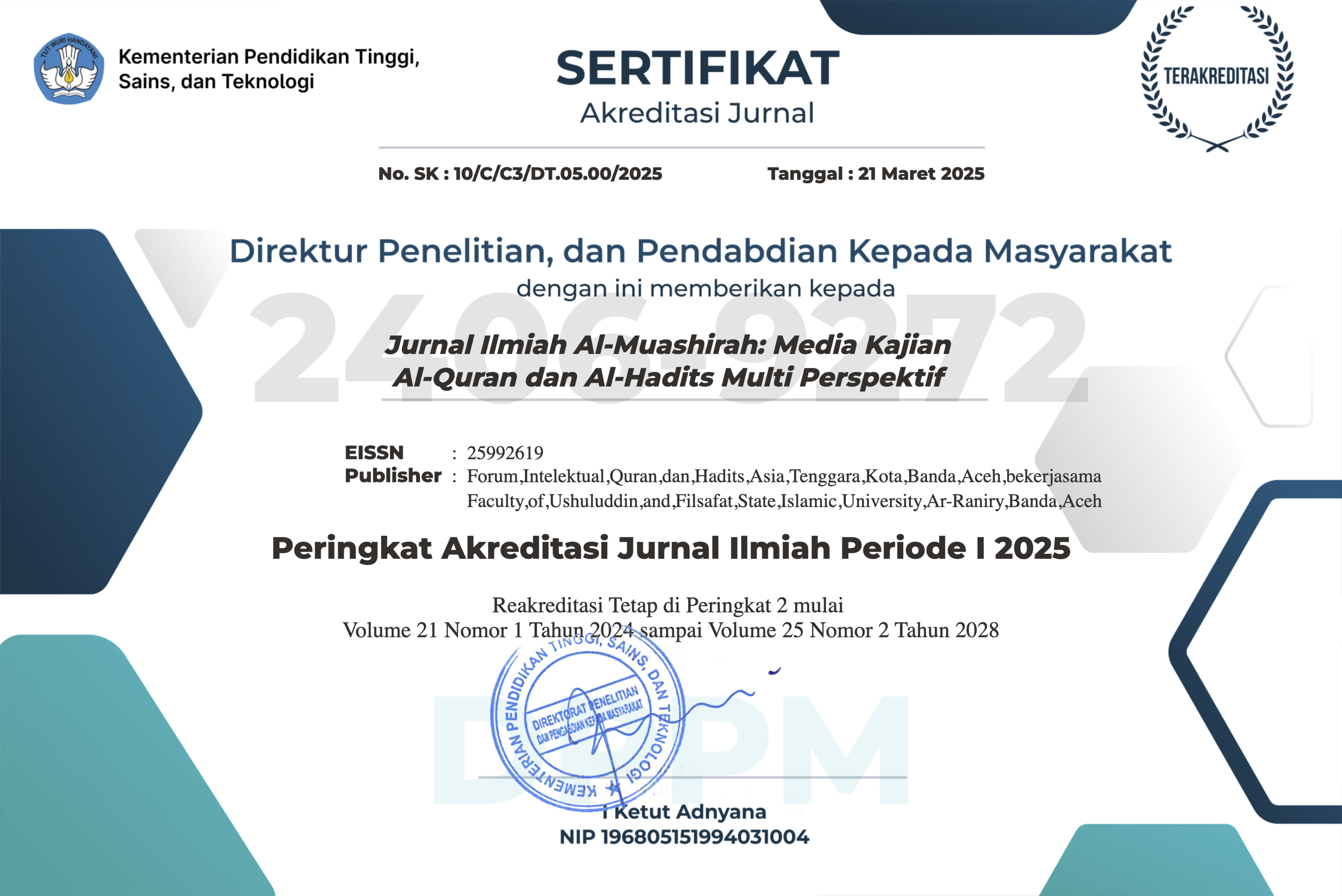Penafsiran Ayat Al-Qur'an Tentang Kesaksian Seorang Lelaki dan Dua Perempuan Dalam Tinjauan Maqashid Shariah
DOI:
https://doi.org/10.22373/jim.v17i1.7906Keywords:
Al-Qur’an Exegesis, One Man Two Women, Testimony, Maqashid Shariah, Gender EqualityAbstract
This article would like to discuss about the meaning of equality on the verse of Al-Qur‟an (Al-Baqarah: 282): “one man two women” in terms of testimony. However, various interpretations have broadly attracted the attention of many interpreters of the Al-Qur'an dealing with the meaning of justice and equality between man and woman. By using Maqashid Shariah as the tool of analysis, this article would like to elaborate more on finding the purposes of sharia by stating that one man equal two women regarding testimony. The main problem is what the verse should be interpreted looks like: whether literally or trying to find the depth meaning by searching the purposes of sharia behind the meaning of justice and equality in terms of testimony of man and woman. Besides, finding the purposes of sharia's view on the issue of gender equality which is increasingly debated in the current contemporary times becomes more important in order to get its comprehensive view on such matter.
Downloads
References
Al-Syathibi, Abu Ishaq, al-Muwafaqat fi Ushl al-Syari’ah, Cairo: al-Maktabah alTijariyyah al-Kubra, t.t.
Fadel, Mohammad, “Two Women, One Man: Knowledge, Power, and Gender in Medieval Sunni Legal Thought”, International Journal of Middle East Studies. 29:2, 1997
Fatima Mernissi, The Veil and the Male Elite, (New York: Addison-Wesley),
Ibn „Ashūr, Muhammad Al-Thahir, Tafsīr al-Taḥrīr wat Tanwīr. (Tunisia: Dār Tūnisiah lin Nasyr), 1984
Mubarrak A. Latief, Husni, Belajar Mudah Fikih Kontemporer – Catatan Kritis Dinamika Metode Penalaran Hukum Islam, Banda Aceh: LKKI Publisher, 2019
Mubarrak A. Latief, Husni, “Revitalisasi Maqasid Syari'ah: Hukum Islam
Berbasis Teoantroposentris”, Jurisprudensi, Vol. 2, Edisi 1, Januari-Juni
Quthb, Sayyid, Fī Dhilāl al-Qur’ān, (Cairo: Dār el-Shurūq), 2003
Raisuniy, Ahmad, Nadhariyyatul Maqashid Shariah ‘inda al-Imam al-Syathibi, Cairo: Dar el-Kalimah li Nasyr wa Tawzi‟, 2014
Rasyid Ridha, Muhammad, Tafsīr al-Manār, (Cairo: Dār al-Manār), 1367 H.
Wadud-Muhsin, Amina, Quran and Woman, (Kuala Lumpur: Penerbit Fajar Bakti Sdn. Bhd.), 1994
Zamakhsyarī, Tafsīr al-Kashshāf ‘an Haqā’iq Tanzīl wa ‘Uyūn al-Aqāwīl fi
Wujūh al-Ta’wīl, (Beirut: Dār el-Ma‟rifah), 2009
Downloads
Published
Issue
Section
License
Authors who publish in Jurnal Ilmiah Al-Mu'ashirah agree to the following terms:
- Authors retain copyright and grant the journal right of first publication with the work simultaneously licensed under a Attribution-ShareAlike 4.0 International (CC BY-SA 4.0) License that allows others to share the work with an acknowledgment of the work's authorship and initial publication in this journal.
- Authors are able to enter into separate, additional contractual arrangements for the non-exclusive distribution of the journal's published version of the work (e.g., post it to an institutional repository or publish it in a book), with an acknowledgment of its initial publication in this journal.
- Authors are permitted and encouraged to post their work online (e.g., in institutional repositories or on their website) prior to and during the submission process, as it can lead to productive exchanges, as well as earlier and greater citation of published work (See The Effect of Open Access).













